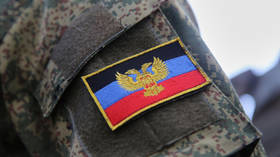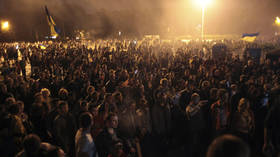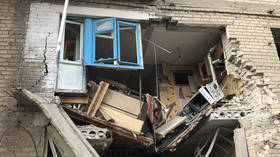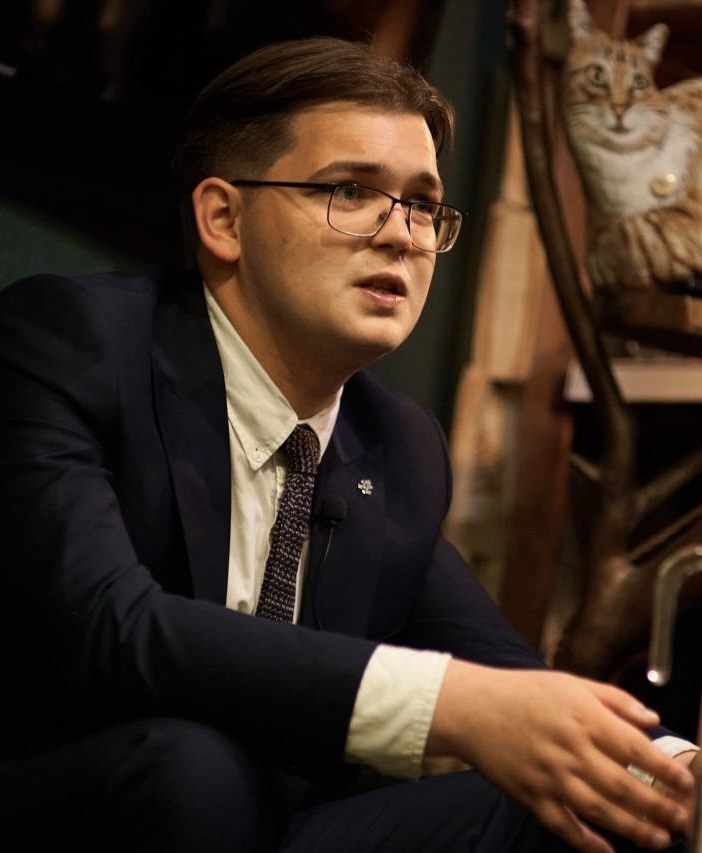Grandma sells sprouts, sends the money to fighters battling Ukraine's forces: How Russia's civil society helps support the Donbass

Many volunteers have headed to the Donbass since Russia's military offensive began, in February. Once there, some help civilians by bringing groceries, medicine, and other supplies. Others assist by clearing debris or working in hospitals.
There is another important task that volunteers are involved in – assisting the troops of the Donetsk (DPR) and Lugansk (LPR) People's Republics. Their mission is to obtain the most modern equipment, the kind that only special forces are usually supplied with. Political strategist Igor Mangushev is one of the people doing this work. His fund, OPSB, collects about 20 million rubles ($322,000) a month in donations, which goes to the Donbass people’s militia. RT spoke with him about his work and Russia’s broader civil society.
– What’s your connection with the Donbass and how did you end up doing relief work in the region?
On June 2, 2014, I came to the LPR to work in the media. Thirty minutes after my arrival, Ukrainian jets bombed the local administration building. It was a miracle that I wasn’t killed – I had stepped out to buy a SIM card and grab something to eat. I took all this as a sign that my participation in the republics’ future should be more active. First, I was involved in the logistical side of things, and then I joined the LPR army. In 2017, I returned to Moscow and worked on an election campaign, which is what I do for a living. So many things happened after that – I’ve worked in Africa, the Middle East, and ended up in Lebanon. I lived in a beautiful city near a sea, but then February 24 happened…
– Why did you decide to become a volunteer? The republics now have actual armies, these are no longer the militia forces that we saw in 2014.
They are still experiencing difficulties with equipment and supplies. It wasn’t part of my plan to come back to Russia, let alone the Donbass, but when I found out that the soldiers needed help, I couldn’t stay away.
My plan was to sit on my balcony, looking at the mountains, sipping cognac and writing triumphant Telegram posts about our army taking over new cities. But things turned out very differently. We are still making modest progress in the Donbass, eroding the enemy’s defense. [But] the [LPR and DPR] soldiers lack communication devices, uniforms, aerial reconnaissance devices, thermal scopes, etc. My team works to redeem those shortcomings, and sometimes it’s a pain.
– Tell us about your team.
We have a small coalition of Telegram channels and we call ourselves OPSB. It was established in 2021, when a vivid discussion started in the Russian social media community among those who are in some way associated with the military. The discussion focused on the Ukrainian Army using drones in the Donbass conflict and what can be the most adequate countermeasure. And a group of like-minded people decided to raise money from our Telegram followers to purchase an anti-drone weapon – a gun used to destroy UAVs. This is how we got to know each other more closely and started discussing other topics as well. After the special military operation was launched, half of our Telegram administrators were off at the war front; others are in supplies and logistics or information campaigns. Everyone is doing their part.
– How many people are currently on the team? And how did they join the project?
We have 16 people. They are mainly the 'old guard' – the people I used to work with in the LPR. But we have newcomers, too – young people. However, I find it difficult to work with them. Newbies require more attention; you need to introduce them to the working process – something I can’t do because I am always very busy. But, frankly, we don’t have massive tasks – ones that require efforts from many people. For now, we are managing just fine. I have always believed that the fewer people you have on a project, the less time it takes to manage their work.
– Why are you focusing your efforts on the military?
First of all, I don’t like civilians (laughs). Then, from my previous experience I know for sure that there is absolutely no sense in helping civilians if the army is not equipped with basic things, because it is on the success of the army that wellbeing in the rear totally depends. There is also a third, egoistical, reason. I love it when my help generates the right response. When you help civilians, there are always problems. Sometimes the canned beef is of the wrong brand or the dry ration is too small. But when you bring something useful to the military, something they can use in combat, they are delighted like kids. There is a good joke me and my friend, poet Anna Dolgareva, like to tell – it’s only worth helping the military and cats. They will eat up everything you give them and then they will bask in the sun and purr.
– How do you select your aid recipients?
People usually turn to us themselves. Sometimes commanders leave messages in the feedback bots of our Telegram channels – or requests come in through the people we know. After that, we go and see for ourselves how the unit is equipped and what they need. If it’s a reservist formation, we’ll give them uniforms and quality body armor, because they won’t need a quadrotor or a thermal imaging system. They will wreck this expensive equipment the very first time they use it in battle, not to mention that it’s not so easy to buy such things in the first place. It’s not easy to get body armor vests either today, because they are in very high demand (laughs). There are priority units – those we are trying to focus on. We are trying to provide them with everything they may need in order to make them perfect, help create an ideal artillery battery, for example, or an ideal infantry platoon. That’s how, step by step, we close one hole after another.
– What do you get asked for the most?
Everything. I can’t single out any one category. A lot of it is military uniforms – they wear out quickly when you’re in the field. There is a serious shortage of communications equipment and quadcopters.
But we only hand out drones when we’re sure the operator has the skills to use them, so that we don’t lose a 200,000- or 300,000-ruble ($3,225 or $4,838) copter after it smashes into a tree during its maiden flight.
Sometimes, we get asked for the most trivial everyday items, such as sapper shovels, water bottles, gas cans, etc. There isn’t a single type of equipment that we don’t supply.
– Do the volunteers contribute a lot to the supply process, or is it just a drop in the bucket?
I’d say it’s a drop in the sea, and even the sea looks like it’s drying up. Yes, on the scale of the entire republic, it’s not much, but we’ve only got a handful of organizations like ours, so, all things considered, our share is quite significant. Besides, we see the result of our work right away. For example, we send a new quadcopter to the boys and, a few days later, we get back a video of them using the drone to take out Ukrainian positions, blow up a Ukrainian trench shelter, or cause damage. It shows us that we are helping.
– The volunteer movement has been an active participant here in the Donbass since the start of the conflict. Ukraine, too, has large volunteer organizations that have been helping out their military ever since 2014. What are the similarities and differences between the volunteer movements in Ukraine and in the republics?
In Ukraine, volunteers are actively recruited by the state: Not only do they have a volunteer movement to help supply the army, but there are also volunteer engineering and design bureaus, volunteer open-source intelligence (these have been quite effective), and volunteer information warfare units. They are certainly ahead of us in terms of organization – but not in terms of manpower.
Even my team, which is relatively small, is assisted by thousands of people. Before Russia’s Sberbank froze my account, my phone used to vibrate every two or three minutes to notify me of new donations. This really is a grassroots movement. However, the Ukrainian volunteers are working in coordination with the state, while we, on the other hand, often have the state throw spanners in our work.
– What do you mean? What problems do you face in your line of work?
One thing you need to realize is that our team and the volunteer movement as a whole are not the same thing. We’ve built up connections from the previous phase of the conflict that allow us to quickly address certain issues. For example, many people experience difficulties on the border, but we do not – we’ve got intelligence officers on our side. There is a sophisticated system of reciprocity. We don’t have problems that we can’t solve, it’s always a question of time. The main obstacle we face in our operations is the lack of understanding on the part of the decision-makers – the people in charge of maintaining and developing the volunteer movement, and ensuring effective communications.
My blocked Sberbank account has three million rubles in it, and that money was supposed to go to the army. But I have no means of unblocking it because we’re working in a ‘gray area’. Once the conflict is over, I think I’ll go back home to Lebanon. Our operations here are not covered by the state in a legal sense, and so far they’ve been reluctant to meet us halfway. Fortunately, we’ve been able to resolve all issues by working with people at ‘ground level’.
– Since the start of the special military operation, has anything changed in the way you interact with the state?
Fortunately, I don’t have to interact with the state, I’m always looking for workarounds. If I did communicate with them, I would have lost my mind long ago. Imagine that a person with no experience at all watches Channel One [Russia's top federal TV network], learns about the fight against Ukrainian Nazis and decides, guided by his best intentions, to help. And then he runs into traffic cops in Matveev Kurgan (a town near the border) who extort from him a bribe of 5,000 rubles. And after that, he is told by customs officers that they won’t let him take his armored vests to the DPR. He’d be frustrated and disillusioned.
– People criticize Russia for not having a civil society. Don’t you think that the volunteers and the work they do these days refute this notion?
I’ve always said that we’ve got a fantastic civil society. Our civil society can raise entire battalions for battle. Even I did not expect the kind of enthusiasm that surged after February 24, 2022. People are writing letters to the soldiers, sending packages. Vladimir Grubnik, who runs a Telegram channel called Ghost of Novorossiya, has an old lady subscribed to him that sells sprouts and sends the proceeds to help the army and to finance the liberation of the Russian Donbass from the Ukrainian regime.
I absolutely admire our civil society, which has displayed unyielding strength and an aptitude for self-organization. A great number of organizations have been created overnight, from scratch. We’ve had information warfare volunteers wreaking havoc on the Ukrainian home front; people are coming to help the troops, assist civilians and help them get back to peaceful life.
– Nevertheless, Russia’s ‘intelligentsia’ have been leaving the country in droves, many people are unapologetically anti-war…
First of all, let’s not exaggerate – not that many people have left. Secondly, it’s the Russian middle class that has been financially supporting my team. I am sorry, but a grandma with a 10,000-ruble pension will not donate half of her monthly income. It’s people from the middle class who make the donations.
And as for those who left or speak against the war… There is a saying in Russian – the smallest bugs are the smelliest. All those who fled think that they are the so-called creative class. But I represent that community as well. I am a political strategist by trade, there are journalists, PR specialists, and other ‘creatives’ on my team. And we are here. Some of those who fled had been benefitting from government contracts for years. And where did they run? To Georgia. The last place on Earth a Russian should go. Creative class, my ass! They are the s**t of the nation, not the brains of the nation (This is a quote by Vladimir Lenin — RT). Now I have hope that when they all run away, I will be able to watch Russian TV again. What did this creative class create? What did it make? Endless Twitter threads about feminism and the rights of sexual minorities? Civilized humanity went through that 20 years ago.
– How much are you able to collect? What is an average donation?
We collect about 20 million [rubles] a month. As far as an average donation goes, it’s hard to calculate. Some transfer smaller amounts – up to 10,000 rubles, but sometimes we get more than 100,000. We have a few major donors who choose to remain anonymous. I guess an average individual donation would be 2,000 to 5,000 rubles. Sometimes, people donate the equipment. But that is usually problematic, because they don’t ask what is actually needed. They would say, “Hey, I have this or that, and I am going to give it to you.” But they don’t care if we really need those things and don’t think about the logistics. We’ve had some funny incidents, too. A wonderful lady donated tarp rain gear – which is very useful – and then asked if we needed an ultrasonic mouse repellent. We had to tell her that the soldiers wouldn’t use it, since mice are food when you are in the trenches (laughs).
– Russia is facing economic hardship because of Western sanctions. Why do people continue to donate money to the army?
People understand that the West waged a civilizational war against Russia. This is not just a regional conflict between Russia and Ukraine; we are witnessing Act One of a major play. And people see that the best investment is to support the most capable army on the continent – the Donbass Army.
– What would be your advice to those who want to become volunteers?
Forget about that idea (he laughs). First off, you need to be able to manage stress well and be prepared to do a thankless job. If you want to do something good, you need to be headstrong, so you can break down walls. Something or somebody will always get in the way. If you are ready for all that – welcome. The best option is to join those who have been volunteering for a long time. If you don’t have any experience or support, you will just give up after facing the reality. And I wouldn’t judge you. If I had started volunteering in 2022, I would’ve been completely burnt out by now. I would’ve just spent all the donations on booze and left.















